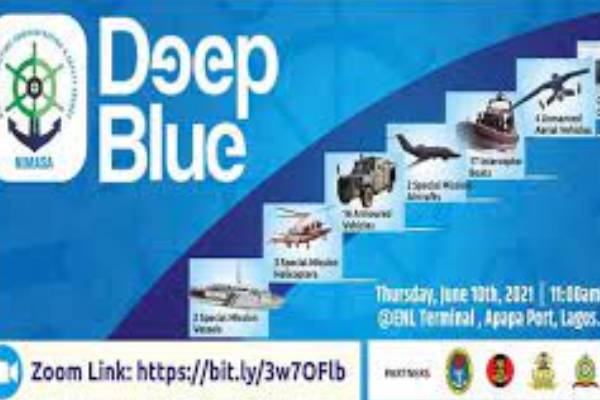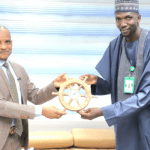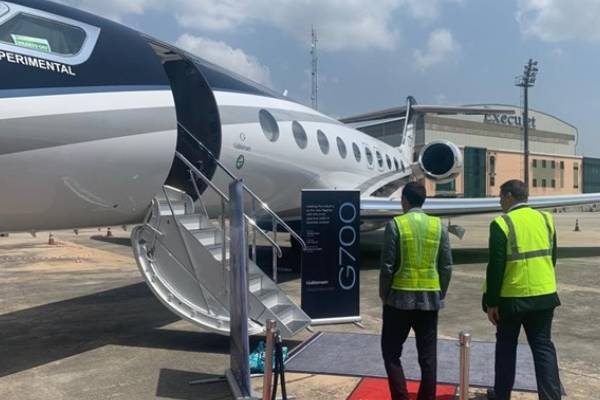The Nigerian Maritime Administration and Safety Agency says it has made remarkable progress in the implementation of the Deep Blue sea Project.
The Director General of the Agency, Bashir Jamoh disclosed this to the Senate committee on Marine Transport when he appeared before the lawmakers to defend the 2023 Budget estimates for his Agency at the National Assembly.
The DG says the deep blue sea project has made it possible for the agency to achieve zero attacks on any vessel on the Nigerian waterways in the last one year.
The Deep Blue Sea Project was initiated between 2016 and 2017 when the international community declared Nigerian waters as the most dangerous to trade.
The Project is designed to assist the Nigerian Maritime Administration and Safety Agency, NIMASA, in securing the vessels navigating the nation’s territorial waters against attacks.
While proposing N160 billon as its total expenditure for the 2023 fiscal year, the Director General of the Agency tells the Senate committee on Marine Transport that the Deep blue sea Project has achieved tremendous success.
He says that the agency has not recorded a single attack since the third quarter of 2021 to date.
The Committee commended the Agency for a Job well done in surmounting these challenges and securing the country’s waterways.
Satisfied by the Agency’s Presentation, the Chairman of the Committee and Other members permits them to take a bow and go.
The Deep Blue Sea project was started as a response to the alarming level of Piracy in the Gulf of Guinea and Nigerian Territorial waters.
According to experts and the statistics from the International Maritime Organisation, the implementation has led to a massive reduction in Piracy in the Gulf and Nigerian Territorial Waters.
This has also allowed the increase in the volume of trade on the waters in the Nations’ exclusive Economic Zone.
The Nigerian Maritime Administration and Safety Agency says it has made remarkable progress in the implementation of the Deep Blue sea Project.
The Director General of the Agency, Bashir Jamoh disclosed this to the Senate committee on Marine Transport when he appeared before the lawmakers to defend the 2023 Budget estimates for his Agency at the National Assembly.
The DG says the deep blue sea project has made it possible for the agency to achieve zero attacks on any vessel on the Nigerian waterways in the last one year.
The Deep Blue Sea Project was initiated between 2016 and 2017 when the international community declared Nigerian waters as the most dangerous to trade.
The Project is designed to assist the Nigerian Maritime Administration and Safety Agency, NIMASA, in securing the vessels navigating the nation’s territorial waters against attacks.
While proposing N160 billon as its total expenditure for the 2023 fiscal year, the Director General of the Agency tells the Senate committee on Marine Transport that the Deep blue sea Project has achieved tremendous success.
He says that the agency has not recorded a single attack since the third quarter of 2021 to date.
The Committee commended the Agency for a Job well done in surmounting these challenges and securing the country’s waterways.
Satisfied by the Agency’s Presentation, the Chairman of the Committee and Other members permits them to take a bow and go.
The Deep Blue Sea project was started as a response to the alarming level of Piracy in the Gulf of Guinea and Nigerian Territorial waters.
According to experts and the statistics from the International Maritime Organisation, the implementation has led to a massive reduction in Piracy in the Gulf and Nigerian Territorial Waters.
This has also allowed the increase in the volume of trade on the waters in the Nations’ exclusive Economic Zone.
The Nigerian Maritime Administration and Safety Agency says it has made remarkable progress in the implementation of the Deep Blue sea Project.
The Director General of the Agency, Bashir Jamoh disclosed this to the Senate committee on Marine Transport when he appeared before the lawmakers to defend the 2023 Budget estimates for his Agency at the National Assembly.
The DG says the deep blue sea project has made it possible for the agency to achieve zero attacks on any vessel on the Nigerian waterways in the last one year.
The Deep Blue Sea Project was initiated between 2016 and 2017 when the international community declared Nigerian waters as the most dangerous to trade.
The Project is designed to assist the Nigerian Maritime Administration and Safety Agency, NIMASA, in securing the vessels navigating the nation’s territorial waters against attacks.
While proposing N160 billon as its total expenditure for the 2023 fiscal year, the Director General of the Agency tells the Senate committee on Marine Transport that the Deep blue sea Project has achieved tremendous success.
He says that the agency has not recorded a single attack since the third quarter of 2021 to date.
The Committee commended the Agency for a Job well done in surmounting these challenges and securing the country’s waterways.
Satisfied by the Agency’s Presentation, the Chairman of the Committee and Other members permits them to take a bow and go.
The Deep Blue Sea project was started as a response to the alarming level of Piracy in the Gulf of Guinea and Nigerian Territorial waters.
According to experts and the statistics from the International Maritime Organisation, the implementation has led to a massive reduction in Piracy in the Gulf and Nigerian Territorial Waters.
This has also allowed the increase in the volume of trade on the waters in the Nations’ exclusive Economic Zone.
The Nigerian Maritime Administration and Safety Agency says it has made remarkable progress in the implementation of the Deep Blue sea Project.
The Director General of the Agency, Bashir Jamoh disclosed this to the Senate committee on Marine Transport when he appeared before the lawmakers to defend the 2023 Budget estimates for his Agency at the National Assembly.
The DG says the deep blue sea project has made it possible for the agency to achieve zero attacks on any vessel on the Nigerian waterways in the last one year.
The Deep Blue Sea Project was initiated between 2016 and 2017 when the international community declared Nigerian waters as the most dangerous to trade.
The Project is designed to assist the Nigerian Maritime Administration and Safety Agency, NIMASA, in securing the vessels navigating the nation’s territorial waters against attacks.
While proposing N160 billon as its total expenditure for the 2023 fiscal year, the Director General of the Agency tells the Senate committee on Marine Transport that the Deep blue sea Project has achieved tremendous success.
He says that the agency has not recorded a single attack since the third quarter of 2021 to date.
The Committee commended the Agency for a Job well done in surmounting these challenges and securing the country’s waterways.
Satisfied by the Agency’s Presentation, the Chairman of the Committee and Other members permits them to take a bow and go.
The Deep Blue Sea project was started as a response to the alarming level of Piracy in the Gulf of Guinea and Nigerian Territorial waters.
According to experts and the statistics from the International Maritime Organisation, the implementation has led to a massive reduction in Piracy in the Gulf and Nigerian Territorial Waters.
This has also allowed the increase in the volume of trade on the waters in the Nations’ exclusive Economic Zone.
The Nigerian Maritime Administration and Safety Agency says it has made remarkable progress in the implementation of the Deep Blue sea Project.
The Director General of the Agency, Bashir Jamoh disclosed this to the Senate committee on Marine Transport when he appeared before the lawmakers to defend the 2023 Budget estimates for his Agency at the National Assembly.
The DG says the deep blue sea project has made it possible for the agency to achieve zero attacks on any vessel on the Nigerian waterways in the last one year.
The Deep Blue Sea Project was initiated between 2016 and 2017 when the international community declared Nigerian waters as the most dangerous to trade.
The Project is designed to assist the Nigerian Maritime Administration and Safety Agency, NIMASA, in securing the vessels navigating the nation’s territorial waters against attacks.
While proposing N160 billon as its total expenditure for the 2023 fiscal year, the Director General of the Agency tells the Senate committee on Marine Transport that the Deep blue sea Project has achieved tremendous success.
He says that the agency has not recorded a single attack since the third quarter of 2021 to date.
The Committee commended the Agency for a Job well done in surmounting these challenges and securing the country’s waterways.
Satisfied by the Agency’s Presentation, the Chairman of the Committee and Other members permits them to take a bow and go.
The Deep Blue Sea project was started as a response to the alarming level of Piracy in the Gulf of Guinea and Nigerian Territorial waters.
According to experts and the statistics from the International Maritime Organisation, the implementation has led to a massive reduction in Piracy in the Gulf and Nigerian Territorial Waters.
This has also allowed the increase in the volume of trade on the waters in the Nations’ exclusive Economic Zone.
The Nigerian Maritime Administration and Safety Agency says it has made remarkable progress in the implementation of the Deep Blue sea Project.
The Director General of the Agency, Bashir Jamoh disclosed this to the Senate committee on Marine Transport when he appeared before the lawmakers to defend the 2023 Budget estimates for his Agency at the National Assembly.
The DG says the deep blue sea project has made it possible for the agency to achieve zero attacks on any vessel on the Nigerian waterways in the last one year.
The Deep Blue Sea Project was initiated between 2016 and 2017 when the international community declared Nigerian waters as the most dangerous to trade.
The Project is designed to assist the Nigerian Maritime Administration and Safety Agency, NIMASA, in securing the vessels navigating the nation’s territorial waters against attacks.
While proposing N160 billon as its total expenditure for the 2023 fiscal year, the Director General of the Agency tells the Senate committee on Marine Transport that the Deep blue sea Project has achieved tremendous success.
He says that the agency has not recorded a single attack since the third quarter of 2021 to date.
The Committee commended the Agency for a Job well done in surmounting these challenges and securing the country’s waterways.
Satisfied by the Agency’s Presentation, the Chairman of the Committee and Other members permits them to take a bow and go.
The Deep Blue Sea project was started as a response to the alarming level of Piracy in the Gulf of Guinea and Nigerian Territorial waters.
According to experts and the statistics from the International Maritime Organisation, the implementation has led to a massive reduction in Piracy in the Gulf and Nigerian Territorial Waters.
This has also allowed the increase in the volume of trade on the waters in the Nations’ exclusive Economic Zone.
The Nigerian Maritime Administration and Safety Agency says it has made remarkable progress in the implementation of the Deep Blue sea Project.
The Director General of the Agency, Bashir Jamoh disclosed this to the Senate committee on Marine Transport when he appeared before the lawmakers to defend the 2023 Budget estimates for his Agency at the National Assembly.
The DG says the deep blue sea project has made it possible for the agency to achieve zero attacks on any vessel on the Nigerian waterways in the last one year.
The Deep Blue Sea Project was initiated between 2016 and 2017 when the international community declared Nigerian waters as the most dangerous to trade.
The Project is designed to assist the Nigerian Maritime Administration and Safety Agency, NIMASA, in securing the vessels navigating the nation’s territorial waters against attacks.
While proposing N160 billon as its total expenditure for the 2023 fiscal year, the Director General of the Agency tells the Senate committee on Marine Transport that the Deep blue sea Project has achieved tremendous success.
He says that the agency has not recorded a single attack since the third quarter of 2021 to date.
The Committee commended the Agency for a Job well done in surmounting these challenges and securing the country’s waterways.
Satisfied by the Agency’s Presentation, the Chairman of the Committee and Other members permits them to take a bow and go.
The Deep Blue Sea project was started as a response to the alarming level of Piracy in the Gulf of Guinea and Nigerian Territorial waters.
According to experts and the statistics from the International Maritime Organisation, the implementation has led to a massive reduction in Piracy in the Gulf and Nigerian Territorial Waters.
This has also allowed the increase in the volume of trade on the waters in the Nations’ exclusive Economic Zone.
The Nigerian Maritime Administration and Safety Agency says it has made remarkable progress in the implementation of the Deep Blue sea Project.
The Director General of the Agency, Bashir Jamoh disclosed this to the Senate committee on Marine Transport when he appeared before the lawmakers to defend the 2023 Budget estimates for his Agency at the National Assembly.
The DG says the deep blue sea project has made it possible for the agency to achieve zero attacks on any vessel on the Nigerian waterways in the last one year.
The Deep Blue Sea Project was initiated between 2016 and 2017 when the international community declared Nigerian waters as the most dangerous to trade.
The Project is designed to assist the Nigerian Maritime Administration and Safety Agency, NIMASA, in securing the vessels navigating the nation’s territorial waters against attacks.
While proposing N160 billon as its total expenditure for the 2023 fiscal year, the Director General of the Agency tells the Senate committee on Marine Transport that the Deep blue sea Project has achieved tremendous success.
He says that the agency has not recorded a single attack since the third quarter of 2021 to date.
The Committee commended the Agency for a Job well done in surmounting these challenges and securing the country’s waterways.
Satisfied by the Agency’s Presentation, the Chairman of the Committee and Other members permits them to take a bow and go.
The Deep Blue Sea project was started as a response to the alarming level of Piracy in the Gulf of Guinea and Nigerian Territorial waters.
According to experts and the statistics from the International Maritime Organisation, the implementation has led to a massive reduction in Piracy in the Gulf and Nigerian Territorial Waters.
This has also allowed the increase in the volume of trade on the waters in the Nations’ exclusive Economic Zone.














